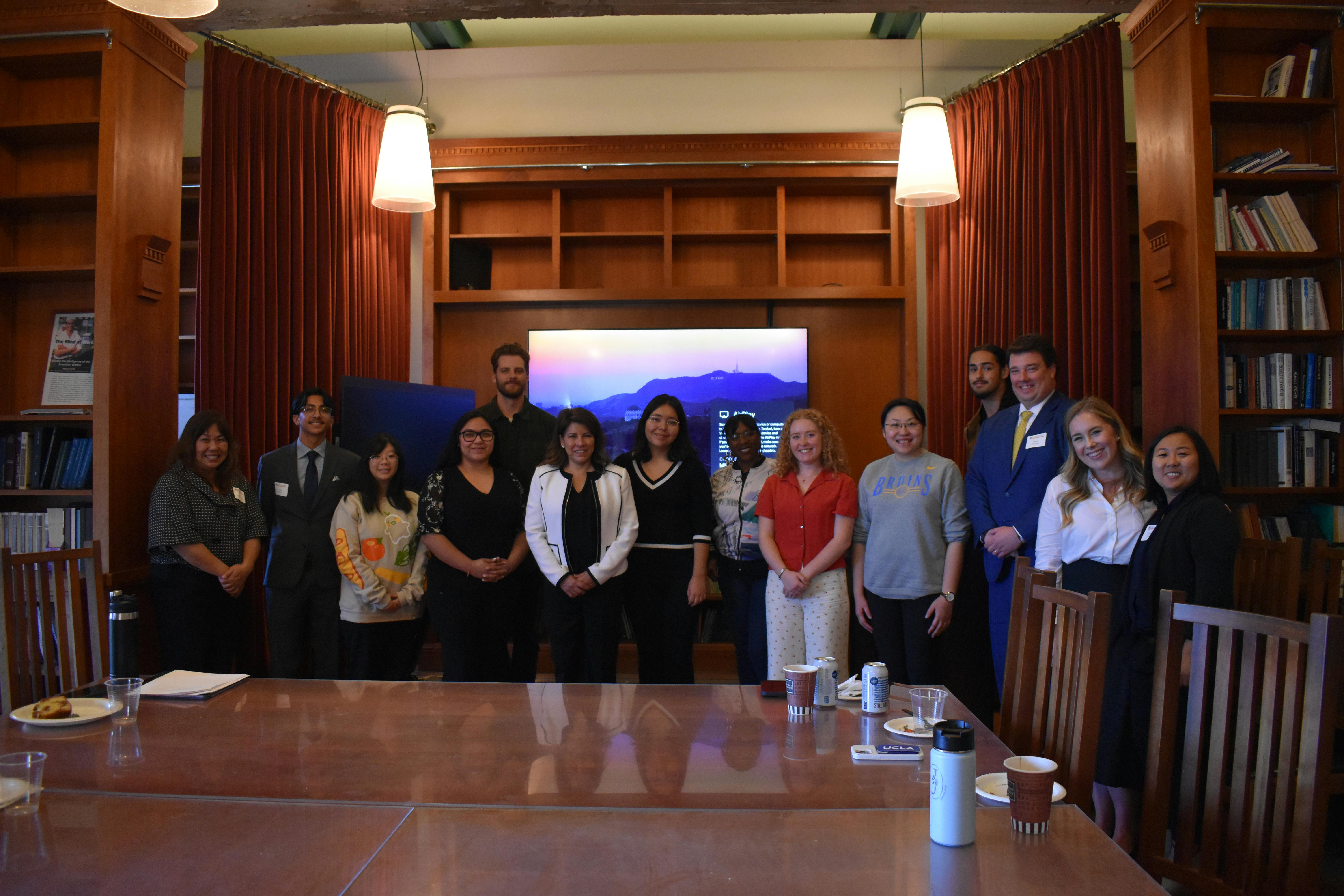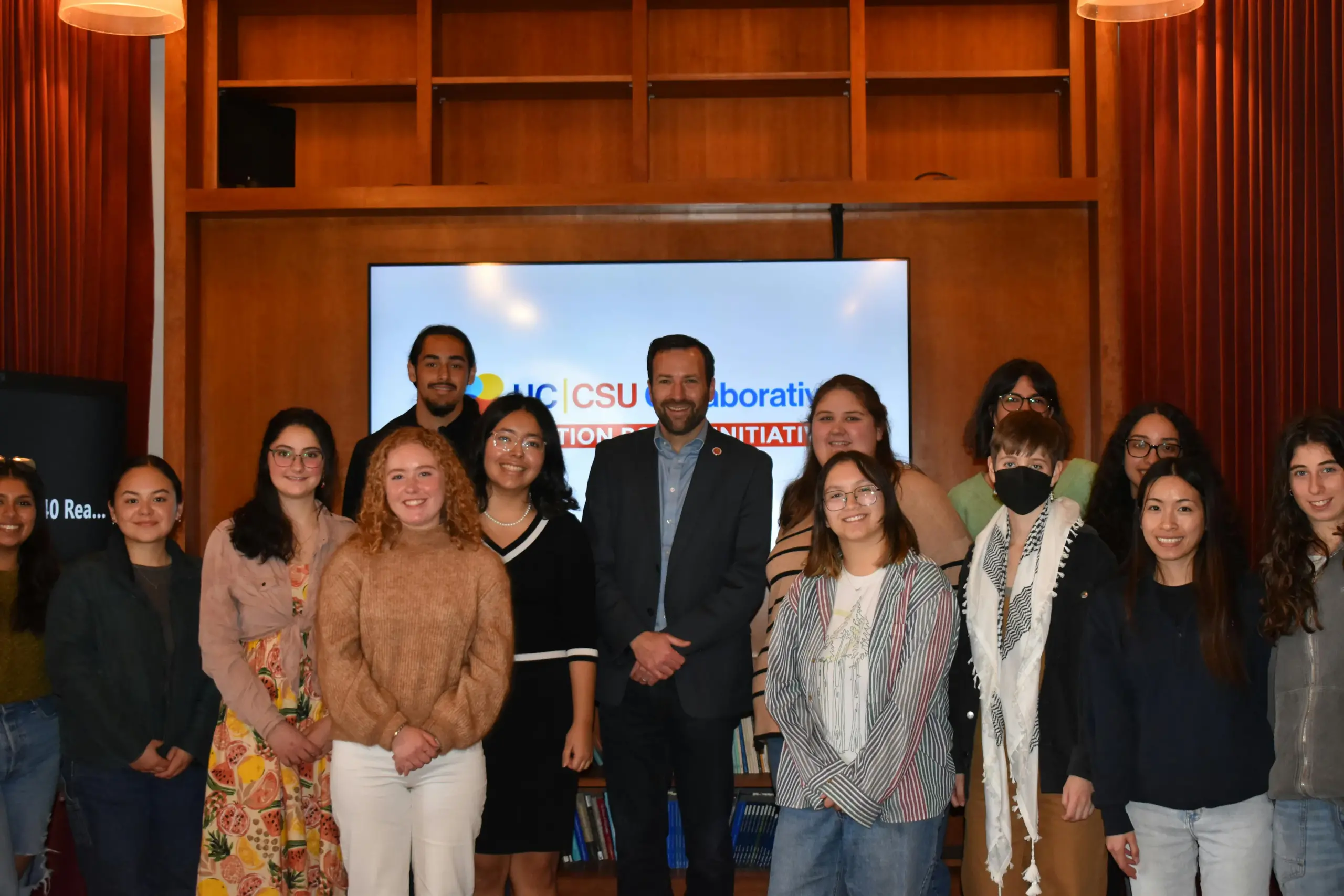Education Policy Initiative engages undergraduate students in an internship examining the complexities of education policymaking in the United States at the local, state, and federal levels.
In Moore Hall, home to the UCLA School of Education and Information Studies, one hears the term “education” often. It’s a word that for many conjures up images of schools and classrooms, of students and teachers, of subjects like mathematics or English.
One word that does not get connected to education often enough though is policy. The UCLA School of Education and Information Studies is trying to change that. It’s important work because education policy greatly shapes what happens in schools and classrooms, how teachers and students are treated and supported, and how core subjects are taught.
The UCLA School of Education and Information Studies is intently focused on education research, practice, and policy. Faculty and research staff practice public scholarship, sharing research on key issues and insights into effective educational practices with policymakers. Of late, the school has also been doing more to ensure that students see and understand the connections between education and policy and have the knowledge and skills to participate in the process.
This past fall, with the leadership of Patrick Brennan, director of public engagement and policy programs, the school launched the Education Policy Initiative. Part of the UC/CSU Collaborative, the initiative engages undergraduate students in an education policy internship examining the complexities of education policymaking in the United States at the local, state, and federal levels. Students explore the institutions, actors, historical context, and policy issues that shape education policy. They also learn to critically assess the impact of policies on students, teachers, and communities. Content for the program is delivered in a series of learning sessions, often engaging important policymakers and/or key members of their staffs. Six UCLA students participated in the first cohort last fall. This winter, 21 students are taking part in the internship, with plans to expand in the future.
“We are just really getting going, but we are excited about this new effort,” Brennan says. “This internship equips students with a comprehensive understanding of education policymaking at different levels of government and empowers them to engage in informed discussions and advocate for positive change. Importantly, it prepares and encourages students to pursue careers in education policy analysis, advocacy, or administration.”
As part of the program, students explore the historical context of education policy in the United States and learn about theories and models of education policy-making. Students take part in news briefings, discussions and debates, and collaborate in group projects and presentations. They also participate in policy analysis and advocacy simulation, policy issue and project tracking, and design and produce policy briefs.
The heart of the course is a series of informal learning sessions where students have the opportunity to meet and talk with federal, state, and local policymakers or key members of their staff.
In February, students met with Rebecca Salay, chief of staff for U.S. Representative Rosa DeLauro. Salay previously served as legislative director, overseeing the Congresswoman’s legislative agenda with a focus on health care, working women, and appropriations and budget committee work. The session provided an overview of federal departments and agencies and their roles, federal legislation and funding, and the dynamics of federal-state relations in education policymaking. Salay, who also worked in the Clinton administration and as a senior health policy associate at the National Partnership for Women and Families, discussed her work as a senior staffer on her House Appropriations Committee and how advocates, particularly students, can best engage with Congress to create equitable and beneficial outcomes. She also gave students advice on how to land a job on Capitol Hill.

Students in the program also had the opportunity to learn from Cathryn Rivera, appointments secretary for California Governor Gavin Newsom. California’s Governor is responsible for more than 3,000 appointments to over 400 boards and commissions and Rivera leads that process. Students attended a lunch meeting with faculty and staff from the UCLA School of Education and Information Studies where Rivera, in conversation with Wasserman Dean Christina Christie, discussed her work to build an administration reflective of California by recruiting leaders of all backgrounds, experiences, and expertise. Later that afternoon, Rivera met in a smaller group with students, sharing ideas and information about how to apply for and take part in state boards and commissions. She encouraged students to apply, emphasizing the importance of the student voice and the need for young people to serve on commissions. During the conversation, she shared stories of how she got involved in politics and policy, building relationships and networks working for Gray Davis when he was governor of California. Rivera also underscored the importance of mentorships for young people beginning careers in the policy world.
On March 6, in a session on state policy, students met with California State Senator Ben Allen in a discussion in the reading room in Moore Hall. In a conversation moderated by undergraduate student Gratia O’Rafferty, Allen told the students how he got started in politics by running for school board in Santa Monica and how that experience shaped him.
“It was a great experience being grounded in not just the community, but in the governance structure,” Allen said. “There’s a lot of complexity to the governance structure of school districts, and a lot of times there are folks making decisions and sacrifices. It really inspired and helped to inform my decisions.”
Building on his interest in education, Allen ran for state senate representing Santa Monica, eventually becoming chair of the Senate Education Committee.
“I loved the education policy stuff, I think that’s why I ran for Senate because I had been thinking about all of these education policy issues,” he said.
Allen said that working with schools helped him to do things based on his own experiences that maybe his staff or policymakers were not aware of. It was very helpful to him and he encouraged the students to build their own experience in education.
“I hear a lot of you are thinking about when teaching and then maybe going into policy. I think that’s a really good path,” Allen told the students. “Because you can study this thing till the cows come home and that is incredibly important. But, actually getting into the classroom, getting into a leadership position within a school district, there’s nothing that compares to that sort of real hands-on experience. It will inform your work, and it will make you a much better decision-maker and policymaker, or researcher for your entire career.”
And for those considering running for elected office, he suggested getting appointed to a public commission or board and advisory group.
“If you can get yourself into this system and observe elected officials and kind of test it yourself, it will give you a brief window into whether you like it or not, because it’s not for everyone,” said Allen.
“I’m really interested in education policy. But it feels daunting to approach such an intense sphere,” student moderator Gratia O’Rafferty said. “Something that I valued was hearing about the Senator’s experience on a board of education and then taking that on-the-ground knowledge into the policymaking process. That’s something to consider as I approach my career and figure out what I want to do next.”
“It’s a great program,” O’Rafferty concluded. “It’s been great to be surrounded by students who have similar interests and to be able to be part of a much smaller community is a really good experience. I recommend it to anyone in the world of education or policy. I think it’s a good way to learn about how policy gets made, developed, and passed.”
